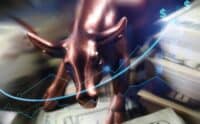
The lackluster results are likely due to consumers’ wariness of the effects of the failure of federal government to forestall the onset of the automatic federal budget cuts of $85 billion (the sequester) that took effect at the beginning of the month. The results of the survey showed that 34% of respondents viewed government economic policies as unfavorable, a new record that surpasses last month’s old record of 31%.
That does not mean that consumers have stopped buying. Sales of durable goods fell only slightly.
But the survey looks at sentiment, not solely at data. And consumers are justly concerned about the federal government’s inability to agree on just about anything. Higher prices for gasoline also play a large role in consumers’ view of the economy, and the slow dip in fuel prices since the first of March hasn’t been enough to offset continuing worries.
It’s Your Money, Your Future—Own It (sponsor)
Are you ahead, or behind on retirement? For families with more than $500,000 saved for retirement, finding a financial advisor who puts your interest first can be the difference, and today it’s easier than ever. SmartAsset’s free tool matches you with up to three fiduciary financial advisors who serve your area in minutes. Each advisor has been carefully vetted and must act in your best interests. Start your search now.
If you’ve saved and built a substantial nest egg for you and your family, don’t delay; get started right here and help your retirement dreams become a retirement reality.
Thank you for reading! Have some feedback for us?
Contact the 24/7 Wall St. editorial team.





